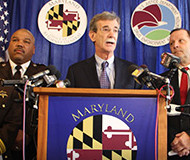1/25/2018
Maryland Attorney General Slaps Speed Camera Cities For Lack of TransparencyMaryland attorney general says cities cannot use speed camera vendors to duck responsibility under government transparency laws.

Maryland's top law enforcement officer thinks cities that use speed cameras have set a bad example for government transparency. In a report released earlier this month, state Attorney General Brian E. Frosh slammed the way several jurisdictions attempted to evade their legal responsibilities under the state public information act (PIA) law.
"Lying at the public end of the spectrum are speed camera vendors, which essentially perform a governmental function -- enforcement of speed limits," Frosh wrote. "In much the same way that the government cannot avoid the PIA by storing its public records with a private vendor, there is some force to the argument that the government should not be able to avoid the PIA by delegating its public responsibilities to a private vendor."
Frosh cited a case in which a district court judge sided with the Maryland Drivers Alliance (MDA) on this very point. The motorist rights group had sued the city of Morningside to force it to turn over the speed camera calibration logs that must be "kept on file" under state law.
"It is notable that the manner of Morningside's denial was that the town completely refused to acknowledge the existence of the public records of these records, attempting to create a 'legal fiction' that because the records were not physically in their possession they did not exist at all, even though they knew the vendor was maintaining them on their behalf," the Maryland Drivers Alliance explained.
The Maryland Public Information Act Compliance Board also issued an opinion stating that Montgomery County should hand over a sample of yellow time data from red light camera tickets so that the MDA could investigate whether drivers were being shortchanged by signal timing that falls below the legally required amount. The county government insisted on charging $19,000 for records that existed in electronic format. While the board slashed the fee by 90 percent, the motorist rights group believes the board's legal authority should be strengthened so that it can force local governments to take the transparency laws seriously.
"The Maryland Drivers Alliance is pleased that our efforts have helped to further the understanding of public records law generally, and we hope that media organizations and activist organizations involved in other issues will benefit from efforts to ensure that public records cannot be concealed or placed behind excessive fee barriers simply by outsourcing the storage and maintenance of records to a private contractor," the group said in a statement.
Frosh explained that he believed existing state laws were sufficient to force third parties to hand over government data on a case-by-case basis.
A copy of the report is available in a 300k PDF file at the source link below.


